Quite a few Henrietta Maria’s got made as I finalised my pattern, and many of them got left in the PHd pile, finished except for hems. (fess up, who else gets to that part and just can’t quite I make it happen…?) I’m slowly reducing the PHds, and adding the Henrietta Maria’s to my wardrobe.
At this point my Costume College packing is going to be entirely Henrietta Maria dresses and historical frocks!
Every time I finish a Henrietta Maria I love it more than the last one, and this one is definitely no exception!
This is the Scroop Henrietta Maria with an elastic waist (tutorial here), in a poly crepe chiffon (it’s a very high quality polyester, and, thanks to the weave, breaths well). I’m calling it my Woodwold dress, because the print reminds me of the description of the amazing wrought-iron gates of Woodwold in Robin McKinley’s Spindle’s End. There are even tiny roses hidden in the print!
This is one of those prints where no matter how you arranged the fabric, it was going to be slightly awkward in combination with your anatomy. I decided that rather than worrying about this, I was going to make it a feature, so I specifically placed frames at my bust. Patterning which mirrors and highlights your anatomy has been a feature of high-fashion pieces for the last couple of years, and in any case I enjoy subverting the expected. Now that it’s finished, I quite like the effect, particularly paired with a V-neck slip.
You may be wondering why I didn’t include an elasticised waist as an option in the HM pattern from the start, and there is a good reason for that. In laying out patterns for printing and in creating instructions, sometimes what you include becomes a balance between your design ideas and ease of use for the buyer.
Sometimes I find myself in a position where I have to decide between lay out a pattern so it prints on two less sheets of A4/Letter paper, but one of the important, tricky pattern features sits directly on the point where four sheets meet, arranging it so no important features fall across page joins, and it’s easier for people to read and use the pattern, but it take two more pages.
With the Henrietta Maria, the logistics of the instructions meant I had the choice between including the elastic waist, or including instructions on bra strap guards – a technique that is useful for every view of the Henrietta Maria, not just the dress, and which is a much more interesting and unusual technique to find in pattern instructions.
For the photos, a friend (with a very nice camera!) and I headed to the botanical gardens, and took advantage of the beautiful fall foliage.
There were people walking dogs, and ducks and late-season ducklings in the pond. We even found a cat to cuddle and pose with:
Happiness!
For tutorials related to this dress, see:

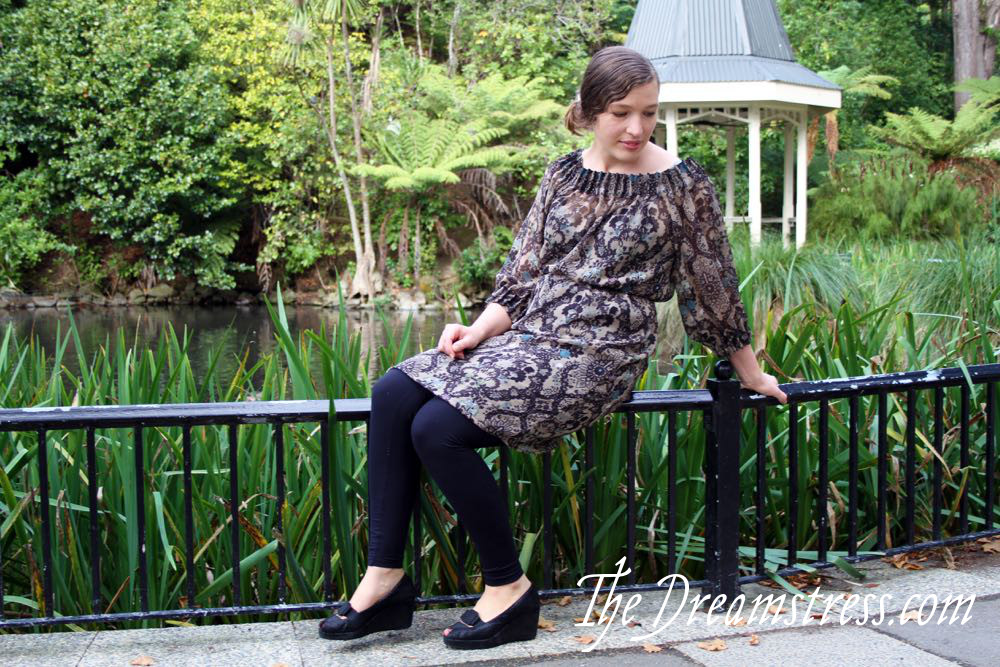


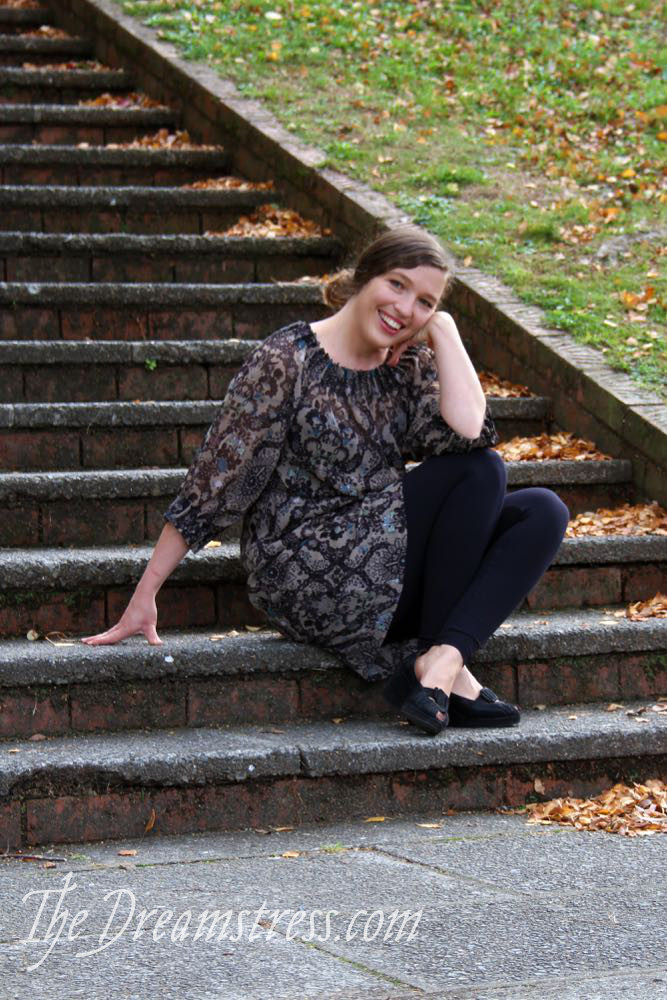

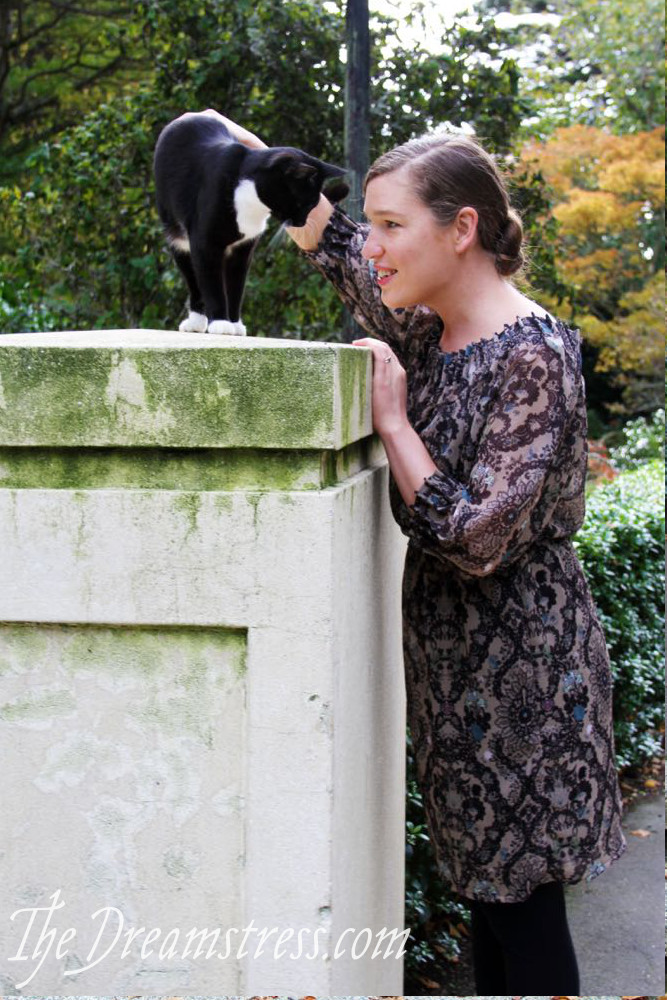
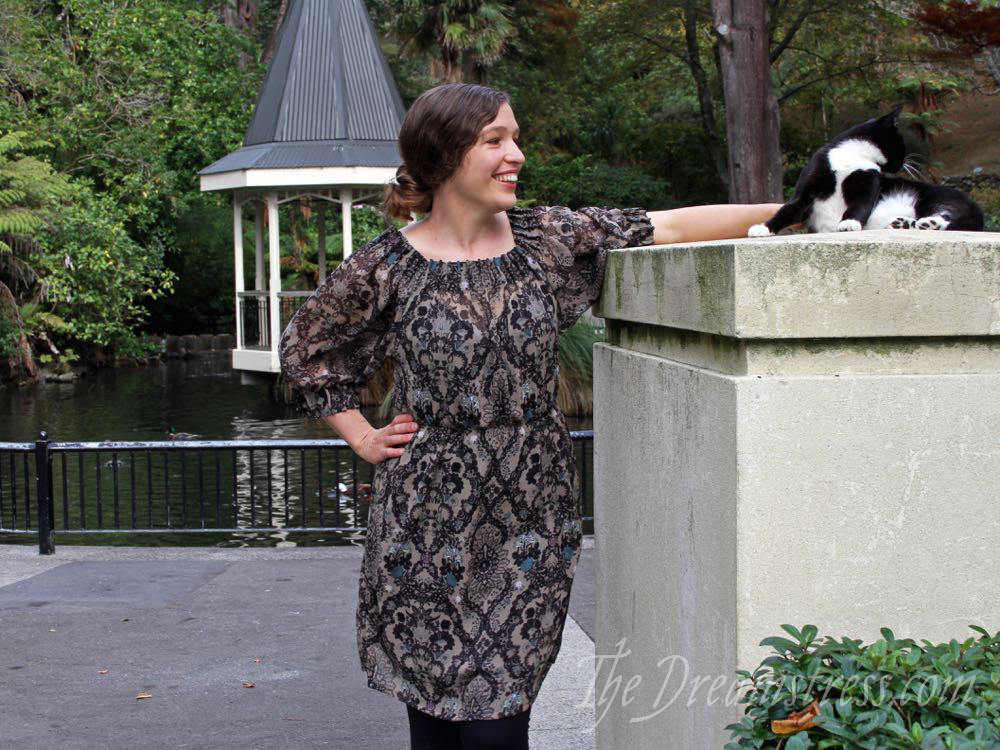
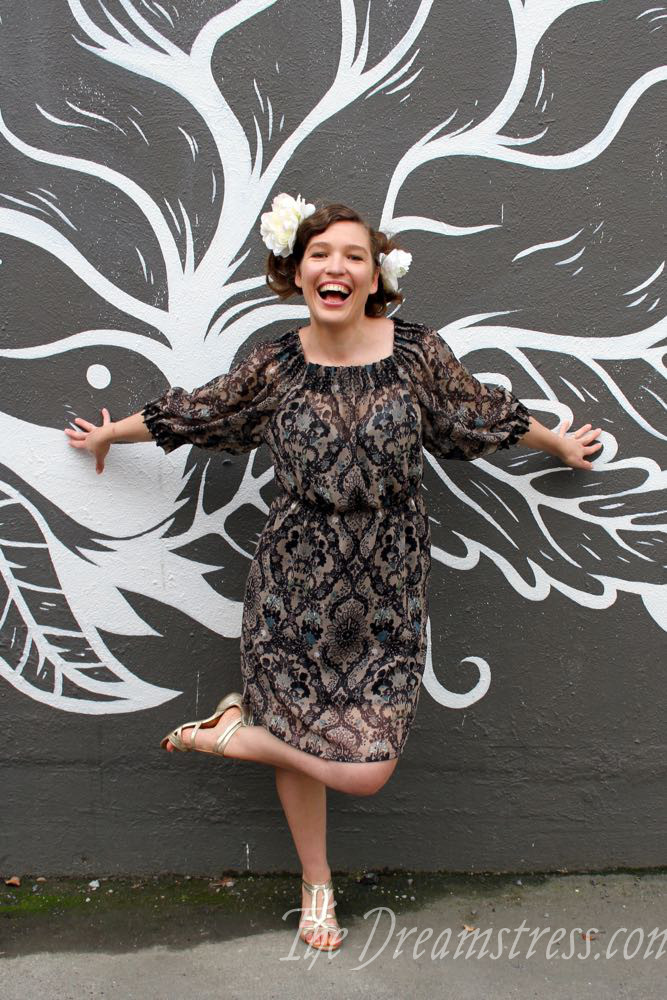
Neato! I support your choice, too, about bra-strap guards. I remember my first grown-up dress that I bought had them, and now I know to look for them in better clothes. They are so useful, and keep you looking so nice.
Thank you! Wow. I have never seen a modern commercial garment that has bra-strap guards. I discovered them in vintage clothing and was instantly converted!
I have a swell dry cleaner/tailor/cobbler who puts them on my clothes when they don’t have them, but they’re a swell litmus test for clothing quality when they do have them! Yes, to instant conversion!
That is an awesome dry cleaner! I wonder if there are any here that offer that service…
Oh, I see what you mean about the v-neck slip–that is lovely with the print! 🙂
Thank you! I was quite pleased with how it worked. It’s like a very modest alternative to the visible ‘bra-lettes’ that the daring young things are wearing, with random straps across the top of your bust. 😉
I’ll take this opportunity to tell you how much I enjoy your blog. I check it every day just in case there is something new. I love it, love it, love it.
And just a question – what is a bra-strap guard?
Oh thank you! I’m so pleased that people enjoy it so much, and I’m sorry I’m not writing something new every day anymore. I just couldn’t keep it up.
And Gillian has explained a bra-strap guard perfectly.
Me too! It’s my little bit of art and textile history. And so what if you can’t post every day–all you can do is your best, and your best really is lovely.
A bra strap guard is a little piece of ribbon or strip of fabric, attached at one end to the shoulderline of a dress, and at the other end is half of a tiny snap fastener that corresponds to the other half of the snap sewn onto the dress. It holds your bra strap in place and stops it from wandering into view. In Yorkshire we call them ‘cami catchers’.
BTW, I do exactly the same as Susan does, and check the blog every day, as I love to read it!
Thanks Gillian! Cami catchers. I love it!
I adore that gorgeous print, and it looks great in your new pattern – congratulations on it’s release by the way!
Thank you!
And welcome back! I’m so pleased you started blogging again! Unfortunately for some weird reason your blog won’t let me comment, but I really enjoy your work!
It is so beautiful! I also love the lace finish on the inside – it’s just like you, beautiful inside and out xo
<3 You are the sweetest!
Oh, I love Spindle’s End! It’s actually right in front of me now – I just started rereading it today. (And yes – I have never seen a pattern with bra strap guards before!)
It’s wonderful isn’t it! One of my favourite McKinley books! I just love the world she has created – it’s so complete and detailed and interesting. And I love Rosie and Peony!
Love this dress! And the bra strap guard was the way to go. So useful. People who want to pull the middle in without going the way of elastic can always make a belt of the same fabric. A simple tie will do.
The fabric is beautiful in this style!
Thank you! <3
Yeah, I just wear most of my Henrietta Maria dresses belted when I want them gathered in, but they ALL have bra guards, which is why I wanted to include instructions on it.
Bra guards are also very useful for keeping garments on the hanger.
Robin
That is true! I favour bigger wooden hangers, so they don’t quite work for mine, sadly.
I love the photos, especially the last one. 🙂 And the cat. Cats make great, but often unwilling accessories. 😀
Thank you! Cats are definitely the best accessories, albeit ones that only want to be photographed on their own terms!